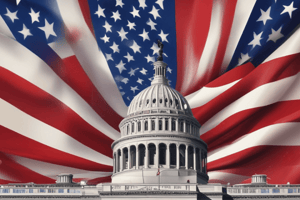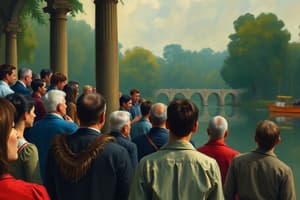Podcast
Questions and Answers
Why do political parties change their beliefs over time?
Why do political parties change their beliefs over time?
- To adapt to voter preferences (correct)
- To lose voter support
- To align with historical traditions
- To maintain a fixed ideology
What is primarily responsible for determining a party's platform and public policies?
What is primarily responsible for determining a party's platform and public policies?
- Government regulations
- The political parties themselves
- Voter preferences (correct)
- Influential political leaders
What does the term 'electoral process' encompass?
What does the term 'electoral process' encompass?
- The evaluation of voter turnout
- The activities from campaign ads to the Electoral College election (correct)
- Only the vote counting after the elections
- The nomination of candidates only
How do political ads often misrepresent information?
How do political ads often misrepresent information?
What is a critical element for a functioning democracy as implied by the content?
What is a critical element for a functioning democracy as implied by the content?
What is a key responsibility of the media in relation to the government?
What is a key responsibility of the media in relation to the government?
What is one major factor that can affect civic participation in the U.S.?
What is one major factor that can affect civic participation in the U.S.?
Which statement reflects a core idea regarding political parties and interest groups?
Which statement reflects a core idea regarding political parties and interest groups?
What is a significant aspect of the electoral process in the United States?
What is a significant aspect of the electoral process in the United States?
What is one question posed regarding the election process in the United States?
What is one question posed regarding the election process in the United States?
How has the two-party system impacted the political landscape of the United States?
How has the two-party system impacted the political landscape of the United States?
What is a consequence of the two-party political system in the U.S.?
What is a consequence of the two-party political system in the U.S.?
Which of the following describes a characteristic of the two-party system?
Which of the following describes a characteristic of the two-party system?
What is a potential impact of the two-party system on economic stability?
What is a potential impact of the two-party system on economic stability?
Which statement correctly identifies a limitation of the two-party system?
Which statement correctly identifies a limitation of the two-party system?
Flashcards
Election Process
Election Process
The process of selecting leaders through voting, it involves multiple stages from candidate nomination to the final election.
Political Parties
Political Parties
Groups of people who share similar political goals and beliefs, they participate in elections and try to influence government decisions.
Interest Groups
Interest Groups
Organizations that advocate for specific interests, they try to shape public policy and government actions through lobbying and advocacy.
Civic Participation
Civic Participation
Signup and view all the flashcards
Geopolitical & Environmental Factors
Geopolitical & Environmental Factors
Signup and view all the flashcards
Political party evolution
Political party evolution
Signup and view all the flashcards
Voter responsibility
Voter responsibility
Signup and view all the flashcards
Electoral process
Electoral process
Signup and view all the flashcards
Offensive political ads
Offensive political ads
Signup and view all the flashcards
Informed voter
Informed voter
Signup and view all the flashcards
Two-Party System
Two-Party System
Signup and view all the flashcards
Impact of Two-Party System
Impact of Two-Party System
Signup and view all the flashcards
Third Parties
Third Parties
Signup and view all the flashcards
Need for Compromise
Need for Compromise
Signup and view all the flashcards
Frequent Power Shifts
Frequent Power Shifts
Signup and view all the flashcards
Study Notes
Unit 5: Influence on Government
- This unit explores political parties, the election process, geopolitical/environmental factors influencing government, interest groups, and the role of media in shaping public perception of US development.
Politics - Political Parties & Elections
- The US electoral system is based on a two-party system, allowing citizens to participate in government.
- Third parties have impacted national elections and reflect the will of the people.
- Political parties involve constituents, influence government decisions, and adapt platforms based on current events.
- Geopolitical and environmental factors affect election participation and policy-making.
Influence in Government - Money, Interest Groups, & Lobbying
- Public policies are influenced by public opinion, interest groups (e.g., PACs, SuperPACs), and individual beliefs.
- Interest groups, representing specific values, shape public policy arguments.
- Different viewpoints, often held by interest groups, influence opposing policies.
The Media and the Government
- Evaluating media and government sources for accuracy is important.
- Media narratives about historical events, elections, and political parties can shape public perception.
- Political parties adapt their stances based on shifting voter preferences instead of holding fixed beliefs.
- Voters have substantial influence on political party platforms and policies.
Social Emotional Learning
- Students have diverse beliefs, so teachers should build positive relationships.
- Students' home situations could affect their views of the electoral process and fairness, which teachers need to be sensitive about.
Misconceptions to Address
- Political parties are not static; their beliefs and positions change based on voter preferences.
- Average people have a significant impact on political parties, as their participation shapes party platforms and laws.
- Understanding the government is crucial for a healthy democracy.
- The election process is not just the Electoral College itself. It includes caucuses, primaries, and election campaigns leading to the Electoral College election.
Focus NCSCOS/Essential Standards - Objectives
- Values and beliefs shape public policies and laws.
- The two-party system has significantly impacted US political culture.
- The accuracy and relationship between media and government are critical for public understanding.
- The election process effectiveness at different levels (national, state, and local) is evaluated in this unit.
- Geopolitical and environmental factors influence civic participation.
- Different perspectives of US history and those of North Carolina highlight different interpretations of past events.
Big Ideas
- There are multiple opinions on the best election procedures.
- Political parties and interest groups provide platforms for similar-minded citizens.
- Citizens can influence policymaking through the electoral process.
Unit Essential Questions
- How effective is the US election process?
- What influences public policy decisions?
- What are reliable sources of information regarding the government and media?
Key Vocabulary
- political party, political landscape, midterm/primary election, ballot, poll/polling station, referendum, precinct, geopolitics, recount, electorate, Electoral College, popular vote, general election, lobbyist, interest group
Essential Vocabulary from Previous Courses (8th)
- policy
Enrichment Vocabulary
- stability, third party, runoff, caucus, convention (political), recall, straight ticket (election), redistricting, gerrymander, disenfranchisement, initiative, disillusionment, Political Action Committee (PAC)
Key Language Uses
- Use narrative, interpret social issues, explain, and argue using specific information
CL.B.1.1
- Students understand how values and beliefs influence the creation and implementation of public policy and laws.
CL.G.1.2
- Students explain geopolitical and environmental factors influencing civic participation and voting.
CL.C&G.3.5, CL.C&G.3.6, CL.C&G.3.7
- Students examine the two-party system's impact on politics.
- Students analyze the relationship between the media and the government.
- Students assess and critique the effectiveness of the federal election process.
Studying That Suits You
Use AI to generate personalized quizzes and flashcards to suit your learning preferences.





